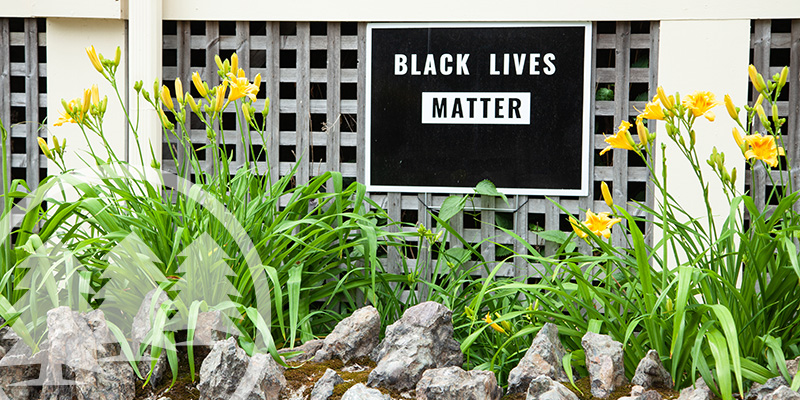One of the ways people express their opinions and views is by putting up protest signs on their private property. But, what if that private property belongs in a homeowners association? Are protest signs in HOA communities allowed?
The Age-Old Issue of Protest Signs in HOA Communities
From the Me Too Movement to Black Lives Matter, there are many social justice issues permeating the United States today. While there are a number of ways people can participate in these campaigns, such as posting on social media and attending protests, many homeowners choose to show their support (for whichever side) by putting up protest signs in their yards or front porches. This may be fine for some homeowners, but for those who live in HOA-run communities, they may encounter some pushback.
As recent as 2020, at the height of election season, one Denver homeowner got into a dispute with their HOA over a Black Lives Matter sign. Melissa Steele, who has lived in her neighborhood for 14 years, showed her support for Black lives by placing a sign in her yard. But, the Lowry Community Master Association sent her a letter asking her to take the sign down.
The sign was apparently in violation of the association’s signage rules. Some of her neighbors who did the same thing received letters as well. Before long, the story received attention from the media. The Lowry board of directors ended up amending their signage rules to allow homeowners to display two signs in their yards.
Prior to the Denver case, a man from Loveland who made headlines also fought with his HOA over a painted American flag that hung on his house. Eight years before that, a woman from Boulder got into a similar dispute with her HOA over a sign condemning the mass slaughter in western Sudan.
These Colorado cases are not the first, and they certainly will not be the last.
HOA Protest Signs and Freedom of Speech
 Homeowners associations are known for imposing strict rules in communities. These rules exist to maintain the curb appeal and character of the community, as well as protect property values.
Homeowners associations are known for imposing strict rules in communities. These rules exist to maintain the curb appeal and character of the community, as well as protect property values.
This also applies to rules restricting signs on private property. Not all HOA residents, though, see it that way. Some members of the community see signage rules as something that restricts their right to freedom of speech.
However, the First Amendment does not really apply to homeowners associations within the context of protest signs. Government bodies can’t restrict freedom of speech, but HOAs generally don’t fall under this category. The relationship between an HOA and its members is more contractual. When a homebuyer purchases a home in an HOA community, they agree to abide by the rules of the association.
Understanding the Right to Display Political Signs
Many states and cities have laws that protect the right of homeowners to display political signs even in HOA communities. Some of these laws, though, only expressly allow owners to display political signs for a specific period of time before, during, and after an election.
For example, in Arizona, homeowners can put up political signs 70 days before election day until 3 days after. A similar law exists in Texas, but the period extends from 90 days before election day until 10 days after.
Meanwhile, in North Carolina, homeowners associations are given the ability to restrict political signs provided their declaration expressly says so. In the absence of state laws or local ordinances, homeowners associations generally have the authority to prohibit political signs provided their governing documents permit it.
Are Community Protest Signs Considered Political Signs?
Even if state laws prevent an association from prohibiting political signs outright, some may argue that protest signs are not political signs. It would require a deeper analysis of the language used in the legislation. The same goes for declarations that ban political signs in an HOA.
If the wording of the legislation or declaration only mentions signs that show support or opposition to a certain election candidate, then protest signs involving Black Lives Matter or Blue Lives Matter are likely not covered. But, if the wording is on the vague side, association boards would be better off allowing protest signs in HOA communities.
It can also be argued, though, that Black Lives Matter signs fall under the category of political signs. Although they are social justice issues, they have become so politicized in today’s climate that it is hard to strictly define them into a single category. Not even experts can unanimously agree on the nature of such protest signs.
Of course, as with all other restrictions, boards must exercise care and consistency when it comes to enforcing the rules on HOA signage. It is unwise to allow one protest sign but not another because of the contents of the sign or due to personal bias. Such a board would likely find itself at risk of liability.
HOA Yard Signs: Reaching a Compromise
 Despite what some people may think, it is not the message behind the sign that HOAs are against. Rather, it is the existence of the sign itself.
Despite what some people may think, it is not the message behind the sign that HOAs are against. Rather, it is the existence of the sign itself.
Remember that the purpose of an HOA is to preserve curb appeal and property values within a community. To accomplish this, it is necessary to maintain the neighborhood’s aesthetics and character. While protest signs in HOA communities allow you to express your opinion, neighbors and homebuyers may see them as eyesores.
This does not mean homeowners and HOAs can’t reach a compromise. In the case of the Lowry HOA, the board revised its rules to accommodate the viewpoints of the residents. If enough people in your community feel strongly about this issue, you may be able to convince your board to follow suit. Keep in mind, though, that your board will still likely restrict the size and placement of these signs, as most other associations do.
The Key to a Harmonious Community
It is not uncommon for homeowners and boards to have disputes over protest signs in HOA communities. Both parties, though, should try to look at the issue from each other’s shoes. Homeowners want a way to show their support or opposition to a particular issue, while HOA boards want to protect the interests of the community as a whole. While state laws and governing documents can play a role, it is not impossible for both sides to come to an understanding.
It is hard to strike a balance between keeping homeowners happy and maintaining the community’s appeal without the help of a professional. Call Cedar Management Group today at (877) 252-3327 or contact us online to request a free proposal.
RELATED ARTICLES:
- HOA Flag Rules: Can The HOA Restrict You From Raising A Flag?
- Homeowners Rights Against HOA: Avoiding Conflict In The Community
- HOA Selective Enforcement: Playing It Fair






